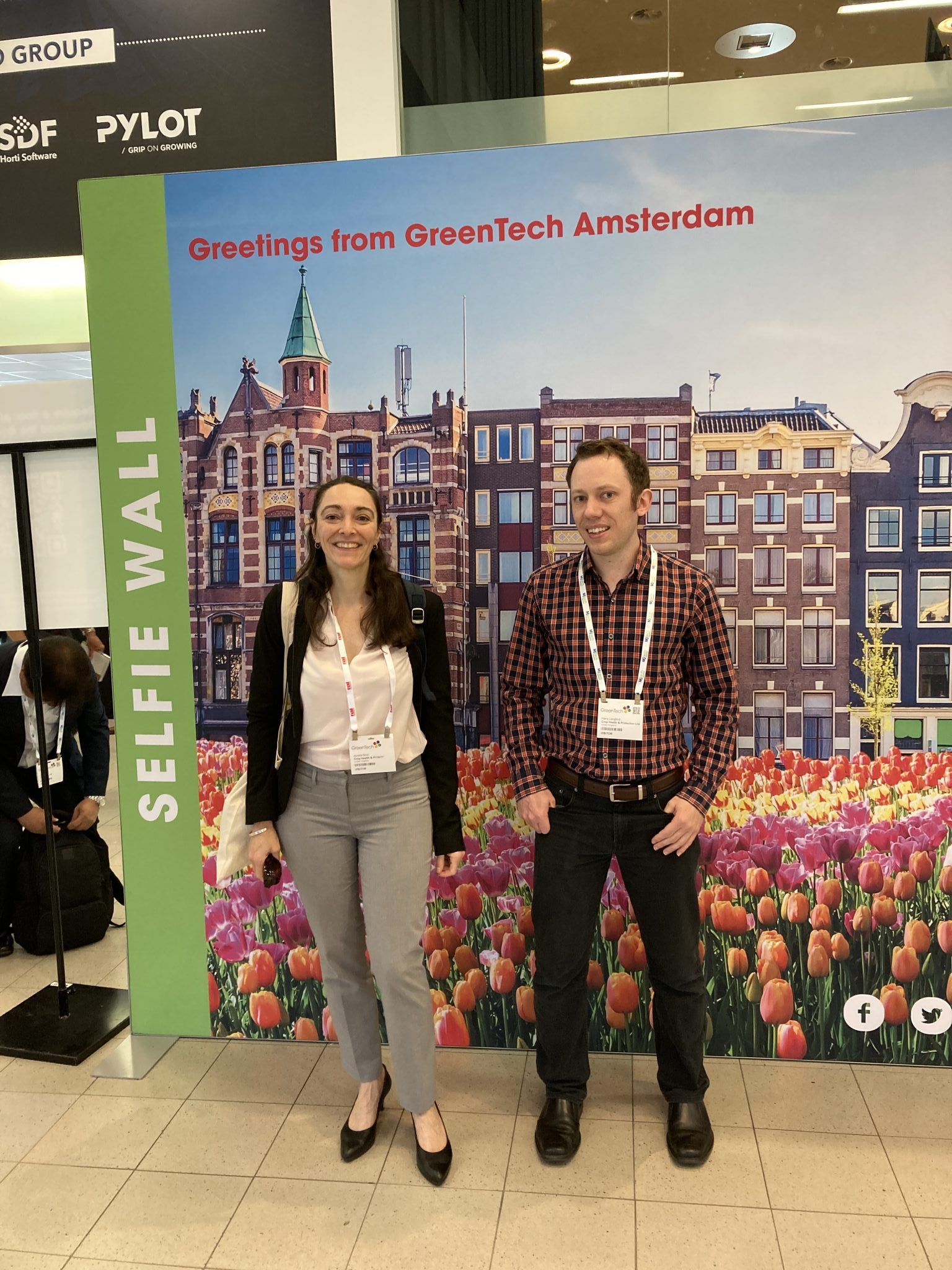“The overarching theme of the event was ‘Happy Food, Healthy Flowers’, highlighting the need to focus our attention on plant health to address food security, whilst reducing impact on resources and carbon emissions – a theme well known and championed by CHAP!
The three-day event was packed with a comprehensive knowledge programme, offering talks on cutting edge solutions and in-depth panel discussions on topics such as energy efficient growing, LCA and ‘footprinting’ tailored to the industry, plant health for sustainable production, alternatives to peat, innovation in crop protection, autonomous greenhouses, indoor farming sustainability, and greening the city.
Energy efficient growing
Frank Kempkes from Wageningen University and Research (WUR) gave an overview of opportunities to make greenhouses more energy efficient and sustainable, from insulation to smart climate control and LED lights to heat-pumps, PV-panels and geothermal heat. He highlighted challenges such as energy use peak load (highest in poor daylight and cold temperatures) and seasonal heat storage that if solved, could help improve energy efficiency and reduce operational costs.
Delphy Improvement Centre described how they reduced CO2 gas loss by 80% when opening their greenhouses vents to let pollinators in, by combining the use of LED to attract the pollinators and monitoring of hives with automated opening and closing of the vents.
Footprinting
Dutch companies MPS and Letsgrow presented the ‘Hortifootprint’ calculator – a tool dedicated to helping horticulture production companies measure their environmental footprint based on criteria such as substrate, energy use and packaging. The dashboard also provides scenarios to compare the impact of changes in carbon footprint score, to support better targeted sustainable choices in production.
Dutch business Royal Lemkes, disclosed they are currently developing a tool to enable different footprinting calculators/tools used by different sectors along product supply chains (e.g. producers, growing substrate suppliers, transport etc) to interact, for a truer picture and to gain a better understanding of changes required for maximum impact and greater sustainability.
Alternative fibres for reduction of peat
Unlike the UK, European countries are not faced with a total peat use ban. Nonetheless, as the industry moves towards reducing its carbon footprint impact, replacing peat as a growing medium is seen as a necessity by most. Andrew Fuller from the Bridge Farm Group (UK) shared lessons learnt in becoming peat-free. Though ten years ago their driver was cost, they also realised it had an impact on reducing their carbon footprint. The main challenges faced were the physical characteristic of the plants, fungi growth issues, nutrient lock-up and water holding capacity.
New innovations in crop protection
Mark Firks from Victory Innovations revealed how their cordless electrostatic sprayers can help with common issues such as uneven or inconsistent coverage, or damage to young crops caused by conventional sprayers. Their technology positively charges spray molecules to enable better coverage, even at the back of the foliage, and prevent dripping.
TU Delft presented results of a collaborative project investigating radio wave treatment of soil for pathogen inactivation, as an alternative to energy intensive steam treatments currently used. The project prototype, Agritron, developed by Koppert Machines, is fully electric and emits radio waves while going over the soil. Field trials evaluated the system and its effect on different pests and pathogens at different depth, and correlated the radio wave energy to biological effects in separate experiments. They showed a significant diminution to complete elimination of pathogens such as Fusarium, insects and of root knot nematodes in the upper layers of soils.
Robotics & AI
Several autonomous picking and harvest robots were on display, including the latest Certhon prototype developed with partner Denso, and the new fleet from Octiva.
The winners of the third WUR ‘Autonomous greenhouse challenge’ also presented their project. For the competition, five international teams produced a lettuce crop using a fully autonomous algorithm with the lowest feasible inputs such as energy and CO2, and the production of a maximum of good quality heads of lettuce to optimize net profits. Winning team Koala used an approach based on an IoT, digital twin and digital decision system developed by start-up Koidra Inc, who are pioneers in the use of physics-informed AI to develop and inform, which is combined with machine learning to reinforce and optimise the system. (read more about the challenge here).
Vertical Farming
CHAP project partner and members LettUs Grow was amongst the companies showcasing their turnkey vertical farming systems at the event. Other British companies included IGS, horticultural LED lighting specialists Vertically Urban and innovative seed cleaning and priming technology company Zayndu, whose ‘activated air’ seed sterilisation technology using cold plasma eliminate the need chemicals or water to treat seeds and boost productivity by priming them all in one go.
This year’s display of innovation and knowledge at GreenTech Amsterdam underlined the opportunity for the horticulture industry to lead the way and become smarter and greener, and provide sustainably and locally grown fresh produce to feed an increasingly urbanised population.”
CHAP aims to build networks of leading scientists, farmers, advisors, businesses and academia to understand industry priorities and develop innovative solutions. To instigate our next project or an area for investigation, e-mail enquiries@chap-solutions.co.uk
Please note, the opinions expressed in this article are the author’s own and do not necessarily reflect the views or opinions of CHAP.












